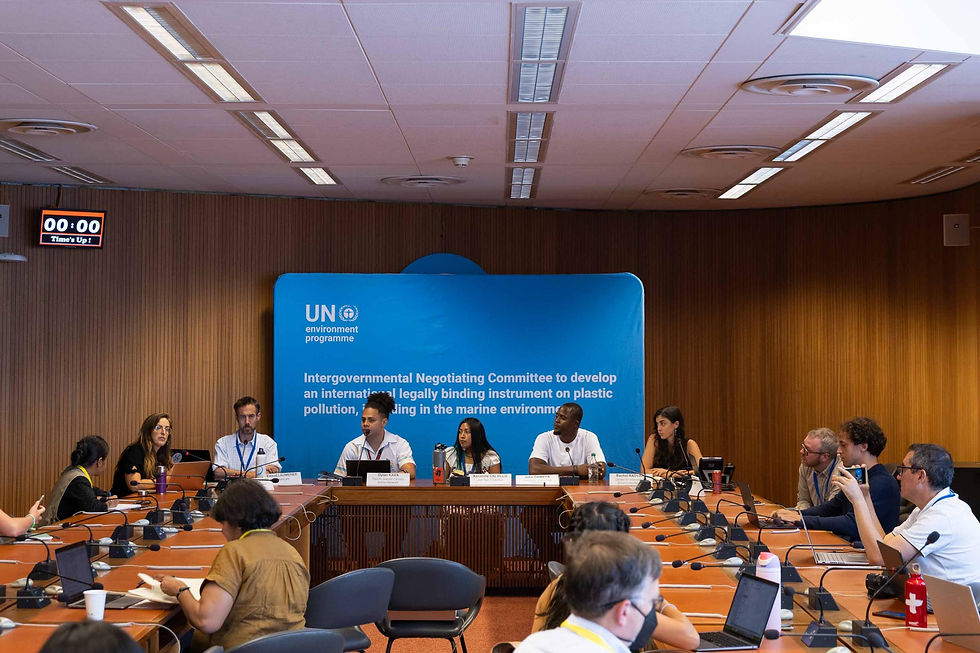Civil Society and Rightsholder Reflections: Fossil Fuel and Chemical Industry Footprint at INC-5.2
- Pacific Islands Climate Action Network

- Aug 7, 2025
- 3 min read

GENEVA, August 7, 2025 — Civil society, scientists, and Indigenous Peoples representatives at the resumed fifth session of the intergovernmental negotiating committee to advance a plastics treaty (INC-5.2) discussed an analysis of negotiation participants, which reveals that at least 234 fossil fuel and chemical industry lobbyists who have registered for the negotiations. The analysis comes as organizations call for the United Nations Environment Programme (UNEP) and the INC Secretariat to advance a strong conflict of interest policy in the negotiations.
During a press conference, speakers offered the following remarks:
Dylan Kava, Strategic Engagement and Communications Lead, Pacific Islands Climate Action Network (Fiji)
The fossil fuel industry playbook is very much alive and present at INC-5.2. The treaty meant to stop plastic pollution is being shaped by those who profit from it. This is the widespread fossil capture of multilateralism. These very spaces are being increasingly occupied by the very actors weaponizing participation to water down ambition and delay systemic change, with increasing influence over the last couple of years. The fossil fuel industry has transitioned from obstruction to orchestration, actively shaping agendas, outcomes, and financing narratives. You cannot solve a crisis by having the very cause of that crisis at the decision-making table, and you cannot speak of justice while sidelining the very communities fighting for survival.
Xananine Calvillo, Co-Founder, Jna Tsjo Collective (Mexico)
In this space, Indigenous Peoples are not only outnumbered by lobbyists, but we also see the same oppression that we see in the outside world reflected in the power dynamics, systems, and structures created for us to align and find convergence.
The guidelines created by these institutions need to be challenged. We are already seeing the burdens of the crisis in our territories, in our lives, and in our bodies. We are putting our work, our trust, and our precious time into these rooms. This crisis not only reflects the crisis of the institutions and of these mechanisms, but it also shows us how the system is replicating itself. These industries are buying decisions to continue with their interests and profit from the destruction of life.
John Chweya, Founder, Empower Grassroots Initiatives (Kenya)
When these treaties are being discussed, it is intentional that the people who benefit most do not want the people who are most impacted by what they bring to the environment to also be in the process. It’s by design that they lock us out. Most of the people who sit at the policymaking table are disconnected from what is happening on the ground and what we represent. Most companies and industries do not understand that we fight to be in these spaces. We bring these realities to their tables.
Ewoud Lauwerier, Plastic Policy Specialist, OceanCare (Switzerland)
These industries are capturing different spaces. They’ve been doing it willingly for a long time, and it really should finally stop. Decision-makers have to be reminded that, under a democratic system, they’re here to represent the people and the citizens. It’s their duty to first exercise public control, which people cannot exercise directly. We have to keep reminding them that that means that private interests who are here are not it. It’s been said that the private sector is civil society, but no. They’re not. They’re representing only one private, financial interest. They’re not representing the communities, they’re not representing living nature, they’re not representing the general well-being, they’re just representing their own financial interests.
Rachel Radvany, Environmental Health Campaigner, Center for International Environmental Law (USA)
There’s a fundamental, irreconcilable conflict of interest between the companies producing plastics and all of us who want to end plastic pollution. We’re setting up a treaty for the long term, and we need to include protections in the treaty and in the future conferences of the Parties (COPs) to make sure that what we’re doing doesn’t lead to the same playbook as the climate COPs, where we have seen more and more lobbyists attend each round of negotiations. This is not normal, and this should not be the way it works. We have been calling on Member States since the beginning, and even more as we’ve seen the negotiations progress, to put strong conflict of interest policies in the treaty text and in the future COPs.
The analysis, conducted by the Center for International Environmental Law (CIEL) — supported by the International Indigenous Peoples’ Forum on Plastics (IIPFP), the International Pollutants Elimination Network (IPEN), the Break Free From Plastic movement, the Global Alliance for Incinerator Alternatives (GAIA), Greenpeace, the Stop Tobacco Pollution Alliance (STPA), the International Alliance of Waste Pickers (IAWP), and Public Services International (PSI) — is based on the United Nations Environment Programme’s (UNEP) provisional list of INC-5.2 participants.




Comments